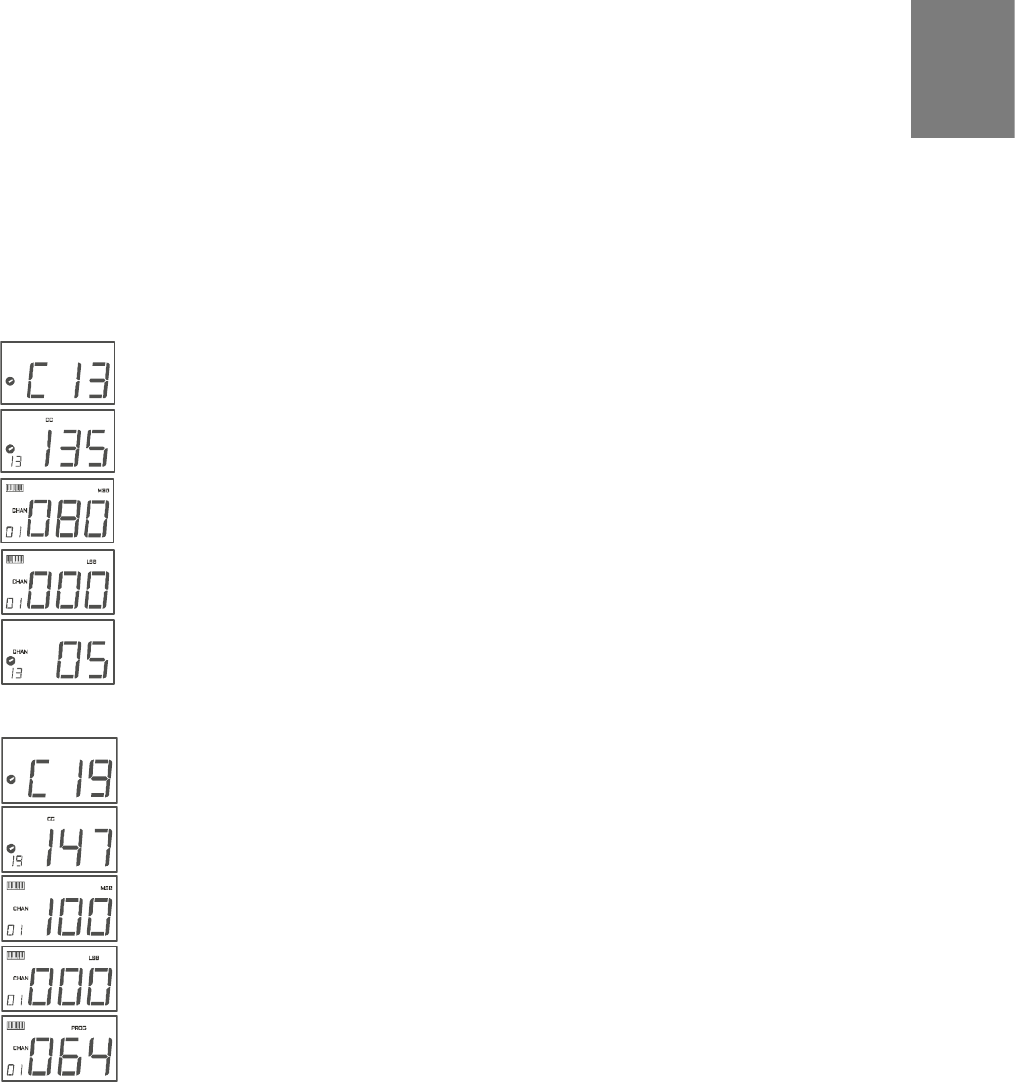
7
English
Assigning RPN/NRPN To A Controller
Note: For a detailed description of RPN/NRPN data see section RPN/NRPN’s Explained on page 9.
1. Press Control select, and move the desired controller.
2. Press control assign twice and while the display is flashing, enter controller 132 for RPN coarse, 133 for RPN fine, 134 for NRPN coarse or
135 for NRPN fine.
3. Press DATA MSB twice to assign the number for the RPN/NRPN MSB.
4. Press DATA LSB twice to assign the number for RPN/NRPN LSB.
5. Press CHANNEL ASSIGN to assign the MIDI channel the message should be sent on.
You will find most data sheets for synths that make use of NRPN’s will give the MSB and LSB values that you should enter into DATA MSB and
DATA LSB banks (also see Appendix F). However, some manuals may only give the hex values. The X-Session requires you to enter the decimal
value. You can easily convert hexadecimal values to decimal using the windows calculator. Simply select Scientific mode, select hex and enter
the hexadecimal value you need to convert. Press the Dec button to convert it to a decimal value. Enter the decimal value into the X-Session.
Alternatively, use the look up table in Appendix C.
The following shows how to set a button to transmit a note on when pressed, and a note off when released.
Assigning A Note To A Button
1. Press SELECT and press the “0” button. The display will show that you have selected controller 19.
2. Press ASSIGN and enter ‘147’ this is the MIDI CC number that corresponds to Note on/off mode, as shown in
Appendix B.
3. Press DATA MSB twice and enter a value of ‘100’. This means when you press the button, a Note on message will
be sent out with a velocity of 100.
4. Press DATA LSB twice, and enter a value of ‘000’. This means when you release the button, a Note off message
will be sent out.
5. Press the PROGRAM button twice and enter ‘064’. This will mean you are sending out MIDI note 64 or E4, each time
you press the button. The MIDI note numbers are given in Appendix D.
This button mode has many uses. You can use this mode to trigger samples, control lighting equipment, play
keyboard notes and much more.
Note: When you press the button in note mode, the LCD display will briefly show the note velocity.
About Sys Ex Messages & Device ID
When transmitting Sys Ex messages, the individual control channel number does not define a transmit channel, but a device ID. This is made
clear since when you press the CHANNEL button, the CC symbol will not be shown and there is no ’c’ in the 3 digit display. Device ID’s range
between 00 – 127. In most cases, you should set the device ID as 127. 127 means the SysEx message will be received by all devices. Please note
that the device ID for a Sys Ex message assigned to a controller can not be changed using the Device ID buttons. These buttons are used for
varying the device ID of the X-Session it self, not just a separate controller.
Non-Volatile Memory
The X-Session uses non-volatile memory so that you can continue where you left off even after powering down and restarting. The current
X-Session controller and channel assignments are stored whether you have stored your setup to a memory locations or not. Also stored is MIDI
Out from USB on/off, Program, DATA LSB and DATA MSB data, global channel setting and last used memory preset.
Programming and Editing the X-Session •


















